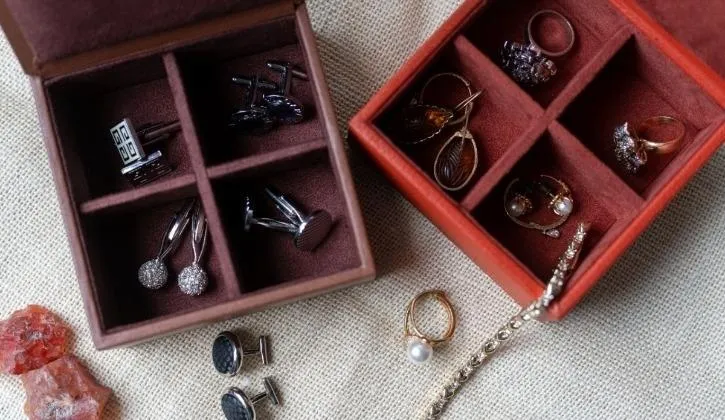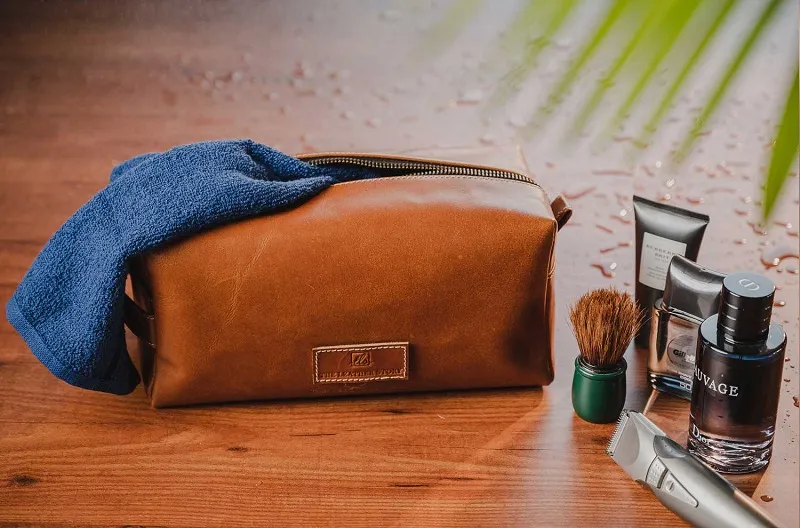How this woman entrepreneur's innovative leather products help you get organised
Aditi Kapur Chawla felt the need for leather-based accessories and organisers that were also easily accessible, and launched The Leather Story (TLS). With over 20 years of experience in the textile and leather industry, she talks about her passion for leather and her journey with TLS.
A merchandising leader in the textile industry, Aditi Kapur Chawla spent over two decades specialising in leather goods before she founded Gurugram-based in February 2020. With her startup, Aditi wanted to bring premium quality leather-based organisers and accessories into the market.
Working with leather
"My passion for accessories helped me realise a gap in the market, and the thought of bringing newness got cemented in my mind. Working in the fashion and lifestyle industry for 18 years has broadened my outlook on intricate detailing for product development, and its potential to bring uniqueness,” Aditi tells HerStory.

Aditi Kapur Chawla, founder of The Leather Story
It involves a vision to create value not only in the business but also in one’s society with great aesthetics and fine quality leather products. So, with years of hard work and thoughtful consideration, The Leather Story was born,” she says.
While Aditi’s journey as a merchandiser in the leather industry started way back in 2001 with a company called Zanelini Leather Wear, where she worked for two years, it was an unplanned visit to a leather garment factory that got her impressed with leather as a material. The experience stuck with her.
At Zanelini, Aditi worked at the shop floor, in a role where she got to learn about the leather industry in its entirety.
She says, “I spent more than two decades working with various international brands, shipping out garments and accessories, since India is a very strong exporter not only with leather as a raw material but also with our craftsmanship. But when I looked around, I wondered why weren't there any local Indian brands doing leather-based accessories and organisers?”
“While on a career break, a conversation with a friend about the absence of good quality leather led me to my eureka moment, where I found my opportunity. We had raw materials, the craft and a market with consumers having limited access to good quality leather products. I immediately worked on my vision board, and started The Leather Story, a brand that's already been in the market for two years,” Aditi adds.
Covid-19 impact
Like so many other retail businesses, The Leather Story too was ravaged by the pandemic. But, Aditi thought of making the best use of the lockdown by identifying opportunities to do several pilot runs, switch gears and add newer categories. “I tried to use this time to the best of my ability, engaging in prototyping more and strategy-building. Things are looking up now, and I truly believe that hard work always pays up,” she shares.
Target audience and more
For Aditi, her target audience comprises millennials and multitaskers who want to simplify their life through accessories. She hopes her products will allow them to organise their stuff stylishly and effortlessly for travel or spending long hours in the office.
“Our products are trendy and made with good quality. The aim is to consciously want to contribute to slow fashion, which in turn would identify The Leather Story as a go-to premium brand for lifestyle accessories,” she notes.

The Leather Story organiser
While TLS was started as a bootstrapped startup, and sustained on an influx of capital in phases, it helped Aditi manage the inventories and helped the brand to grow “300 percent in the last two years”.
The D2C online platform offers a plethora of leather products from cigar cases, desktop accessories like pencil cases, notebook organiser, pen wallet etc., to watch roll and box, cufflink box, cell phone sling bag and more. The prices of these products are anywhere between Rs 600 and Rs 12,545. Products from TLS are also listed on other marketplaces like Caelum, LBB and Men’s XP and also a boutique named Gifts of Love, online and in their stores in Delhi and Gurugram.

The Leather Story carry bag
Additionally, TLS actively participates in exhibitions and popups like The Pink Post It, The She Shop and the latest one scheduled with The Yellow Blossoms in New Delhi.
Aditi is now planning to raise funds for TLS to expand her design options and hopes to be on the next season of Shark Tank India.
Women in leather industry
Leather industry in India has one of the youngest workforces with 55 percent of the workforce below 35 years of age. The industry generates employment opportunities for approximately 2.5 million people, of which 30 percent are women. And compared to other industries, while this industry has far better representation of women, gender imbalance is still existent.
According to Aditi, while the tanneries are predominantly managed by men, the design and merchandising departments can really step up to bridge the gender imbalance in the industry.
“The industry is also dependent on the overall socio-economic growth of a state and the facilities available there, which usually causes the difference in the working gender ratio. If you look geographically, you’ll see more women workers in the South than in the North. Nonetheless, she shares that the retail space in these times is well-represented by women. Being a woman entrepreneur and a brand owner, we are undoubtedly breaking the barriers,” she remarks.
Finally, Aditi believes that women need to make their own financial decisions even as entrepreneurs.
“I think many women do not take independent financial decisions, and they are still dependent on men for majority approval. A major shift in this behaviour is needed to improve the situation and see a difference. It is imperative to introduce a finance-related curriculum in schools and colleges for our future women leaders. Alternatively, I feel there should be courses that offer solutions to initial challenges faced by startups or mentorship programs that can help make entrepreneurs independent,” she says, as she cannot emphasise enough on the need for better financial literacy at all stages.
Edited by Anju Narayanan









